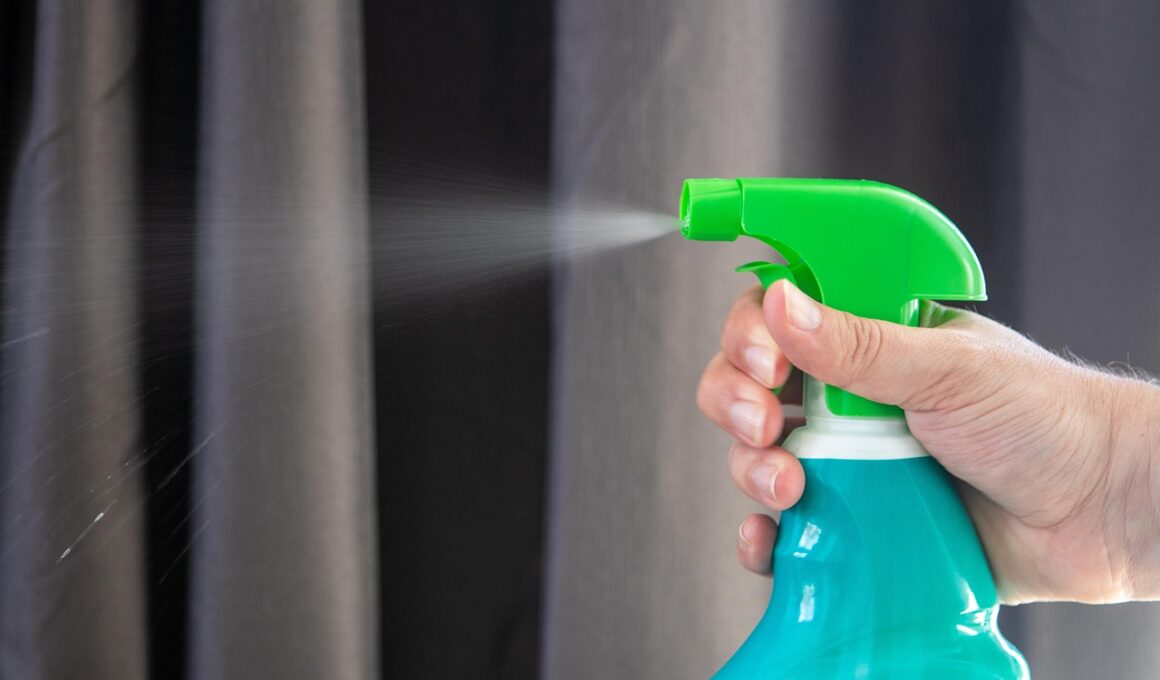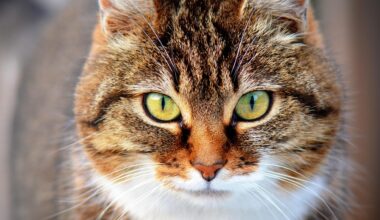The Impact of Household Chemicals and Perfumes on Cat Mental Health
Understanding the influence of household chemicals and perfumes on cats’ mental health is crucial for responsible pet ownership. Cats are sensitive creatures, often affected profoundly by environmental factors. Many common household items, from cleaning products to scented candles, can release volatile organic compounds (VOCs) that may disrupt their sense of well-being. A range of chemicals found in cleaning items, air fresheners, and personal care products can be harmful to them. These substances can cause distress, leading to behavioral problems such as anxiety and aggression. A well-maintained environment is essential for happy cats, which means being aware of the materials and substances used in the household. Research shows that prolonged exposure to certain chemicals is linked to various mental health issues in cats, such as chronic stress. Providing fresh air through ventilation, minimizing the use of harsh chemicals, and opting for natural alternatives can enhance a cat’s quality of life significantly. It is imperative to prioritize their mental well-being by understanding the significance of a chemical-free household. This awareness can lead to healthier, happier feline companions.
To help optimize a cat’s environment, owners should choose non-toxic cleaning products. Consider items labeled as pet-safe and environmentally friendly. Many brands offer alternatives that are effective yet gentle on both pets and humans. Ingredients like vinegar and baking soda can effectively replace harsh chemical cleaners. By incorporating plants into the home, care must be taken, as some are toxic to cats. Researching the specific needs of your feline friend can ensure a safe indoor garden. Furthermore, providing safe, natural scents can improve mental well-being. For example, essential oils such as chamomile and lavender can promote relaxation if used cautiously. Always verify which oils are safe, as some can be harmful to cats. Seeking advice from a veterinarian may help clarify safe choices. Overall, a clean, safe environment fosters mental health by reducing stress and anxiety in cats. Moreover, customizing the living space can enhance emotions and mood. Therefore, developing a preference for natural alternatives will ensure a healthier environment for cats. The balance between cleanliness and pet safety is crucial for optimal mental well-being, allowing cats to thrive in a loving household.
Understanding Cats’ Sensitivity
Cats possess a heightened sense of smell. This attribute makes them uniquely sensitive to its environment, including scents from household products. Traditional cleaning agents and perfumes often contain artificial fragrances that can lead to nausea or fear. These reactions in cats can stem from their instinct to avoid potential toxins in nature, making them wary of unfamiliar scents. Increased exposure to these products can lead to a persistent state of stress or anxiety, adversely affecting behavior and overall health. Understanding their reactions is crucial for monitoring their mental health. Many cat owners inadvertently contribute to their pets’ unease by ignoring signs of distress. Observing changes in behavior, such as frequent hiding or sudden aggression, may indicate an adverse reaction to household items. Additionally, prolonged stress can lead to health issues such as compulsive behavior or litter box problems. In contrast, safe scents can provide comfort. Creating a peaceful environment free of synthetic fragrances can foster a sense of security. Building awareness about the products used helps ensure that cats lead fulfilling lives, free from unnecessary stressors that affect their mental state.
Another essential aspect of maintaining a cat’s mental health is ensuring their space allows for natural behaviors. This includes providing scratching posts, climbing trees, and secure hiding spots. When their instincts are supported, cats experience reduced stress, contributing positively to their overall health. Environmental enrichment, combined with a chemical-free environment, plays a vital role in promoting mental well-being. Implementing interactive playtime is another effective way to address mental health concerns. Engaging with toys or laser pointers stimulates their mind, warding off boredom and anxiety. The key is to recognize any behavioral shifts that may suggest mental fatigue or anxiety. For instance, excessive vocalization or changes in appetite may signify chemical sensitivity or stress. Creating routines, such as daily play or designated quiet time, promotes a sense of stability. Offering safe spaces within the home where they can retreat is equally important. By prioritizing both physical and psychological aspects, owners pave the way for happier cats. Balancing environmental modifications is paramount for use and understanding, ensuring that feline friends live joyfully in safe surroundings.
The Role of Regular Vet Check-ups
Regular veterinary check-ups also hold tremendous value in monitoring a cat’s mental health in relation to environmental factors. Vets can provide insights into how recent changes at home may impact your cat. Discussing lifestyle modifications or concerning behaviors will enable professionals to offer tailored advice. When environmental stressors are identified early, proactive measures can prevent escalation. Illness or sight issues may compound existing anxieties, making routine examinations crucial for early diagnosis. Furthermore, bringing awareness to the psychological effects of specific chemicals can open conversations about better practices. Additionally, veterinarians can recommend suitable alternatives like pheromone diffusers that can help create a calming atmosphere. Regular vet visits are essential in ensuring a cat’s health and addressing mental challenges due to chemical sensitivities. Ensuring access to necessary vaccinations and health checks will ultimately contribute to overall well-being. Conversations with the vet should prioritize behavioral patterns alongside physical health. Utilizing their expertise in combination with conscious environmental choices fosters resilience against stressors. Cats can enjoy healthier lives filled with joy through commitment to regular check-ups and preventive strategies.
Moreover, the implications of mental well-being extend beyond mere comfort to overall health. A happy cat is often a healthy cat, and addressing mental stressors leads to better physical outcomes. When cats suffer from anxiety or distress due to chemical exposure, they can develop serious health implications, such as urinary issues or gastrointestinal problems. Recognizing these relationships emphasizes the importance of maintaining a safe household. Educating oneself about safe products for clothes, cleaning, and fragrances can ensure environmental safety. The welfare of pets is not just about physical surroundings, but also about emotional security. Natural solutions, such as calming herbs or interactive toys, can ease the challenges of anxiety and encourage positive behaviors. By combining physical solutions with psychological approaches, cat owners can create enriching environments. Promoting the concept of a pet-friendly home is essential for a healthy living space. Pets need not suffer in silence; their well-being is in our hands. Prioritizing mental health through environmental modifications is crucial for ensuring a fulfilling life for our feline friends. The road to mental wellness begins with identifying and reducing potential household stressors.
In conclusion, the impact of household chemicals and perfumes on cat mental health cannot be underestimated. Owners must recognize that their choices directly affect their pets’ well-being. Prioritizing natural and safe household products can significantly enhance a cat’s life. By adopting cleaner practices, along with regular veterinary visits, pet owners foster an environment conducive to mental health. Understanding the nuances of cat behavior and their reactions to environmental changes will further support wellbeing. Committing to a safe living space can lead to reduced anxiety and happier, healthier cats. Pets provide companionship that enriches our lives, and it is only fitting that we return the favor. Focusing on minimizing exposure to harmful substances is vital. Simple changes, such as substituting cleaning products or limiting harsh scents, can create meaningful positive effects. The aim is to generate a cat-friendly habitat that nurtures both physical and mental states. Your proactive measures will help establish a safe haven that allows cats to thrive. Empowering their mental wellness improves their happiness, leading to strong bonds between cats and their humans. Ultimately, this fosters a serene, loving, and healthy environment.
Steps to Create a Safe Environment
Taking concrete steps to limit exposure to harmful chemicals is an essential priority for ensuring optimal cat mental health. Owners should educate themselves on the labels of products they purchase and actively look for chemical-free alternatives. This proactive mindset helps minimize potential risks. Consider using more natural cleaning items available at pet stores or opting for DIY recipes with non-toxic ingredients. Regularly ventilating the home also contributes to improved air quality. If concerned about specific products, conducting research or consulting professionals can yield valuable insights. Cat owners can also benefit from establishing a routine that incorporates relaxation and playtime away from potential stressors. Creating an environment that promotes mental and emotional well-being significantly impacts a cat’s overall quality of life. Every small transition leads to a healthier and happier pet. High-quality food, limited allergens, and a varied diet can also enhance well-being. Furthermore, easily accessible outdoor spaces can improve mental clarity by providing natural stimuli. The aim is to foster a balanced life filled with joy while ensuring safety. Focusing on enriching their environment with safe options honors their natural instincts and supports mental stability.


